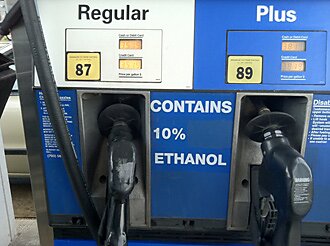The federal government imposes a mandate to blend ethanol into gasoline. This “Renewable Fuel Standard” harms consumers, damages the economy, and produces negative environmental effects. The mandate has also spawned a bureaucratic trading system in ethanol credits, which the Wall Street Journal reports is bankrupting a refinery in Pennsylvania.
The rubber hits the road with that “10% Ethanol” sticker you see on the pump when you fill your tank. The sticker signifies that the government is imposing a foolish policy on the nation at the behest of a handful of selfish senators, who are bucking the interests of America’s 220 million motorists.
Nick Loris discusses some ethanol basics at DownsizingGovernment.org. And Thomas Landstreet reiterated some of the problems with the mandate in the WSJ the other day:
The corn ethanol mandate was created under the Energy Policy Act of 2005. Two years later, President Bush signed the Energy Independence and Security Act, which expanded the program by providing generous tax credits and subsidies to corn growers and ethanol blenders. It also established ambitious targets, increasing annually, for biofuels in the national fuel mix. The mandate soon diverted 40% of America’s corn crop away from the food supply.
The government-imposed shortage caused corn prices to float from long-term mean levels of about $2 per bushel to more than $8 per bushel in 2012. This extraordinary price surge prompted a range of harmful responses in the farming industry. Farmers planted 17 million new acres of corn at the expense of soybeans, wheat, hay and cotton, driving prices for those crops to all-time highs as well. Cattle farmers, unable to afford corn gluten feed, culled their herds to levels not seen in 60 years, causing beef prices to rise an incredible 60% from 2007 to 2012. Over this five-year period, the IMF food price index rose 42%.
…The country has endured a startling amount of economic disruption for what is clearly an inferior source of energy. Ethanol produces 34% less energy per volume than conventional gasoline, reducing cars’ fuel economy. As for its effect on the environment, a 2010 Congressional Budget Office study found that corn-based ethanol subsidies are terribly inefficient, with the government spending an estimated $754 per metric ton of avoided emissions—an astronomically high price tag compared with other policies. (The economics of climate change literature estimates the “social cost of carbon” at far lower levels, meaning the program is inefficient even on its own terms.)
Moreover, ethanol is too corrosive to be transported through pipelines, so trucks must transport it. Growing corn also requires more water than other crops—and the policy gave farmers an incentive to plant only corn, which depleted the soil of nutrients. A 2008 study in Science found that converting natural environments for biofuel production can produce hundreds of times more carbon emissions than the biofuels themselves would save. No wonder ethanol mandates are losing support among environmentalists.
The ethanol mandate reduces freedom and costs you money at the gas pump for no reason other than to line the pockets of corn farmers, who already benefit from billions of dollars of federal farm subsidies. The mandate is stupid policy and ought to be repealed.

